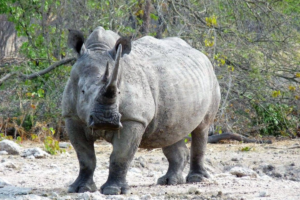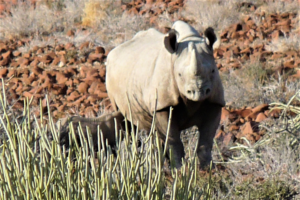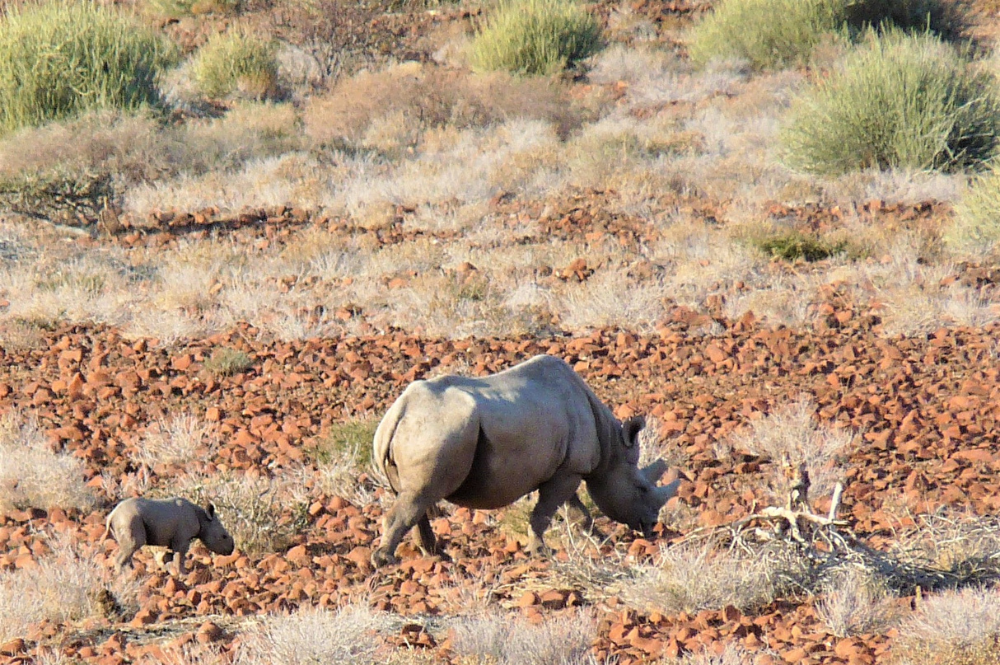In 2022, 87 rhinos were poached for their horns in Namibia, up a staggering 93% on the figure for 2021, when 45 were killed, according to the Ministry of Environment, Forestry and Tourism’s (MEFT) spokesperson, Romeo Muyunda. Most worrying of all, 46 of the rhino poached were in the world famous Etosha National Park.
Muyunda said that of those killed, 61 were of the rarer black rhino species and 26 were white rhino. In recent years, rhino poaching had been increasingly brought under control in Namibia, after 101 rhinos were killed in 2015. Yet now, with more than half of those poached in 2022 killed in in Etosha, where it would be expected that the national park popular with tourists and with government-funded anti-poaching teams, is of great concern.
Of the 41 rhino killed outside Etosha, 15 were poached on rhino custodianship farms, and 25 on private farms that have small populations of white rhino. Namibia’s Black Rhino Custodianship Programme started on 14 April 1993, when the first six rhino were translocated from national parks to a privately-owned farm under an agreement signed by the farmer and MEFT. Later in 1993, five more black rhinos were moved to a second private farm. All black rhinos in Namibia are property of the state, because of their endangered status, while the more numerous white rhinos are not part of the custodianship programme and can be privately owned.
No rhinos were reported to have been killed on the community conservancies last year, where land is owned and managed by Namibian rural communities, who can receive income from safari tourism, hunting and farming to support the residents. Maxi Pia Louis, Director of NACSO (National Association of CBNRM* organisation), which supports the conservancies and represents them, told me on 31 January that the announcement of such an increase in poaching was very sad, though she confirmed that no rhino were known to have been poached on conservancies in 2022, although two suspected poachers had been caught.
Inside job
In June 2022, the Minister of Environment, Forestry and Tourism, Pohamba Shifeta, announced that MEFT was investigating some of its own employees working in Etosha, after 11 rhinos were found dead there with their horns removed. Shifeta said that these poaching incidents were suspected of being an “inside job”, with some staff working with organised poaching syndicates, who were then smuggling the horn out of the country to the markets in China, Vietnam and other far eastern countries.

Problems at Etosha
There has been no word on the extent to which overall rise in poaching can be put down to insiders helping poachers, but there are clearly problems in Etosha, despite Minister Shifeta appointing retired police commander Ndahangwapo Kashihakumwa to lead anti-poaching efforts in the Park in June 2022. According to Shifeta, Kashihakumwa, who currently heads the anti-poaching unit, based in Windhoek, has been deployed with immediate effect as a security adjustment. “We will not relent in ensuring maximum protection of our iconic species in the flagship Etosha National Park and indeed elsewhere in the country”, Shifeta declared at the time.
After the announcement of the overall rise in rhino poaching, Kenneth Uiseb, Deputy Director of Wildlife, Research and Monitoring at MEFT, told me that, “it is a real pity that we continue to see poaching of rhino in our flagship National Park. I think it maybe more to do with internal systems not functioning effectively. Resources are pumped into Etosha, but still we see cases going up. I believe a change in strategy and involving more of the communities neighbouring the Park holds the solution to poaching.”

Worrying loss of black rhino
The loss of a large number of black rhinos is particularly worrying. The species is listed by the International Union for the Conservation of Nature as Critically Endangered, with an estimated 6,195 left in the wild. But white rhino have been hit hard in recent years, especially in South Africa, with numbers dropping from 18,067 five years ago, to 15,942 now.
*CBNRM – Community-based natural resource management
Professor Keith Somerville is a member of the Durrell Institute of Conservation and Ecology at the University of Kent and teaches at the Centre for Journalism. He has written a number of books on wildlife and conservation issues such as the ivory trade, human-lion conflict, hyenas, jackals, honey badgers and is currently writing a study of the history of human exploitation and conservation of African rhinos for Pelagic Books.








